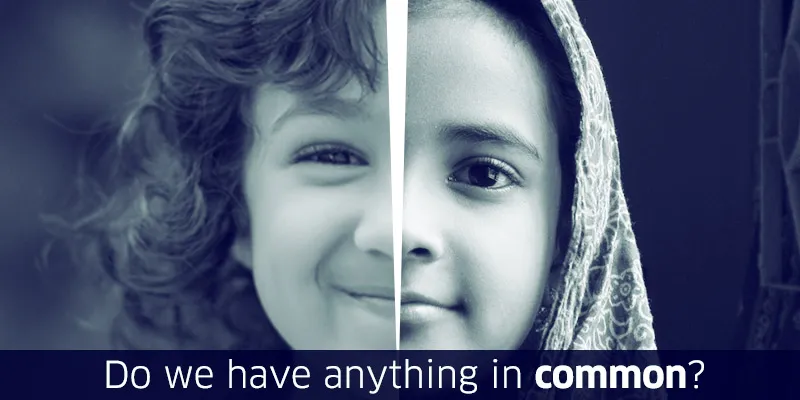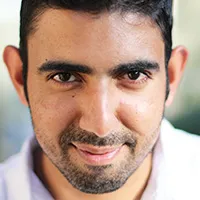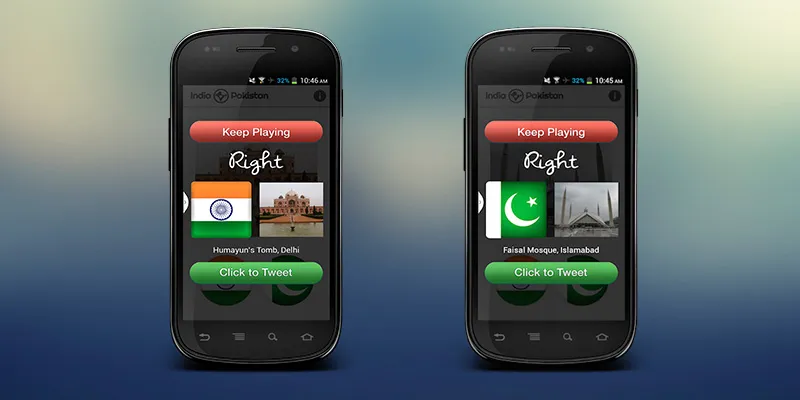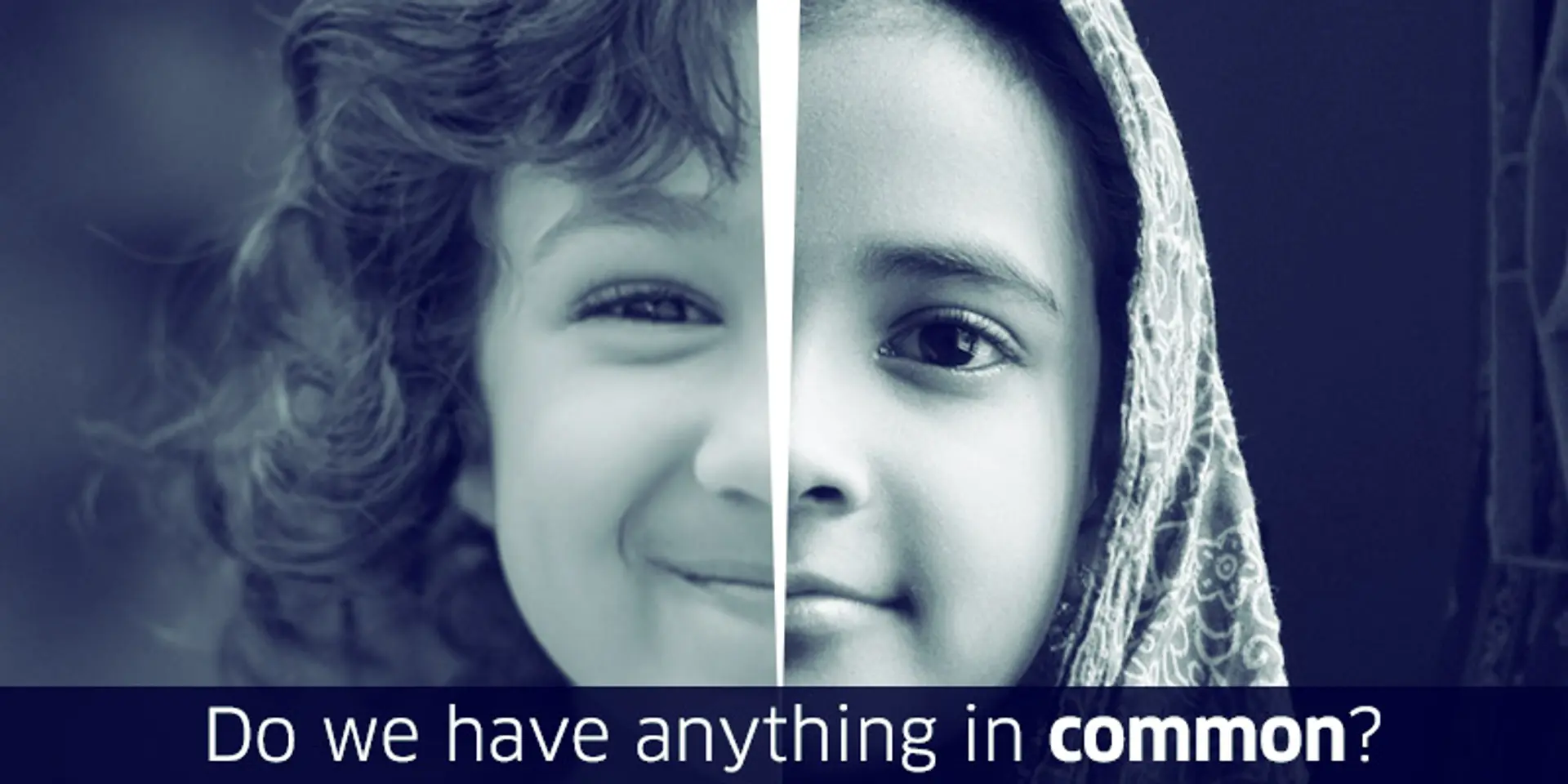How one man brought 2,00,000 Indians and Pakistanis closer through a mobile app
On the surface, India and Pakistan may not be the best of friends, with constant ceasefire violations at the border and other political issues. We are fierce rivals on the sports field, too. This influences the general public opinion to a certain extent, and sometimes even sows the seeds of mistrust or hate. However, the moot question is: ‘Are we as people really that different? Can we relate to each other in any way?’

In 2012, Amrit Sharma was tapping away at his keyboard and working on a TPS (Testing procedure specification) report, when he received a chat message from his friend, Michael Elliott. It was a link to a TED talk by Ronny Edry, a graphic designer from Israel. It highlighted a story of how a simple poster went viral, and sparked a movement between Israel and Iran; with the general public communicating with each other through simple positive messages.

Amrit watched the video in awe, and still remembers getting goose-bumps that day. Edry's work inspired people to create thousands of Facebook groups titled ‘Israel loves Iran’, and other variations featuring different countries’ names. Amrit found that there were already a few Facebook groups titled ‘India loves Pakistan’ and ‘Pakistan loves India.’ But several days later, when he still couldn't get Edry's talk and his ideas out of his head, he registered the domain, IndiaLovesPakistan.com, as the first step towards working on something substantial for the cause.
Amrit realized that despite being neighbours, the vast majority of Indians and Pakistanis didn’t know much of each other. He, however, had grown up in Kathmandu, Nepal, in a much more cosmopolitan atmosphere, surrounded by people of all nationalities. He had many Pakistani friends, too, right from his kindergarten days till university. In light of this, Amrit wanted to work on humanizing the India-Pakistan relationship. He thought of using technology and social media (with their vast reach) to take this initiative forward and break stereotypes. He says:
I have a dream that one day people will be judged by the quality and depth of their character, and not the colour of their passport.
With this idea ensconced in his mind, he hired a freelance developer and a graphic designer, and developed a free Android app, titled ‘India or Pakistan’. He launched it on Valentine's Day, in February, 2015. The idea for the app was simple - when presented with a photograph with different landmarks and/or figures - could people identify whether the picture represented India or Pakistan? The people, streets, monuments, and even the food of the two countries are actually quite similar, and therein lies the challenge of identification, one way or another.

Related read: ‘India loves Pakistan’ aims to restrict the Indo-Pak rivalry to just the sports field
After the launch he got great feedback from both sides of the border, and across the world; with people appreciating the simplicity and the thought behind the app. Amrit adds,
I really enjoy handing my phone to friends to try out the app and watch their reaction. They smile when they get the answers right, but it's more fun when they confidently answer a question, and moments later, find that it's not correct. That's priceless! It's not about your score at the end of the game, but the renewed sense of realization that we aren't as different as we had initially assumed.
As of August, 2015, the app has been downloaded more than 200,000 times, and has received largely positive reviews with over 500 five star ratings, and an overall score of 4.3 out of 5. While most of the growth has been organic - through word and mouth - and awareness through media, Amrit did also focus on App Store Optimization (ASO), email marketing through the IndiaLovesPakistan list, and built-in social sharing options to give the app a boost.
The backstory
Amrit started this initiative as a social cause and is not looking to generate profits from it, but it is close to his heart for various reasons. In 2002, at the age of 16, when he was living in Nepal and preparing to taking his Cambridge O-level exams, he discovered that all four of his grandparents used to live in what is now Pakistan.
In 1947, some sixty odd years ago, the people of India finally succeeded in sending the British packing, and the country was free again after almost 200 years. It was also the time when Pakistan was born. Shortly before August 14, 1947, Amrit’s grandparents (who lived in Pakistan) felt compelled to take a few of their essential belongings, and set off towards what was to become the present-day India.
The fertile land along the Indus River that they had called home for many generations was no longer considered safe for a Hindu family. So his grandparents walked, drove, and ultimately hopped onto a train that brought them to New Delhi, along with thousands of other refugees.
Amrit was in Delhi when the recent earthquake struck Nepal in 2015. He bought an airplane ticket and flew to Kathmandu the next day. Since he was born, and has spent a large part of his youth, in Nepal, he wanted to be there to help out. There, he saw people from all nationalities pitch in and help the local residents in their time of need. One among them was Dr. Fahim Rahim, a successful doctor, entrepreneur, and award-winning humanitarian. He was also the Chairman of JRM Foundation (JRMfoundation.org), and was leading two large volunteer run relief efforts in Nepal, post the earthquake.
So, when Amrit wanted to run a campaign titled #IndiaPakistanDay, he reached out to Dr. Rahim and the JRM Foundation, which was the first organization to support the cause. The theme of the campaign was spread using social media channels such as Facebook and Twitter: "We want to live by each other's happiness, not each other's misery.”
Amrit has found an outpouring of support from people and organizations for #IndiaPakistanDay. Apart from The JRM Foundation, Sarhadpaar - a campaign by Beyond Violence, ELAJ Trust, Never Forget Pakistan, Aman ki Asha, Arun Gandhi, the Gandhi Center for Peace, the BE magazine, Aaghaz-e-dosti, and also Ronny Edry's Peace Factory, have all extended support to the cause.
Future plans
Going forward, Amrit aims to continue to be creative, and use technology to have a social impact that humanizes the India-Pakistan relationship. He adds,
I'm talking to software developers right now about how I can make this Android app open source. I'd love to see this app replicated for other countries, and I'm curious to see the interesting ways in which the open source community further develops this app.
You can support the campaign here and download the app. You can also follow them on Facebook and Twitter.
Happy Independence Day!







